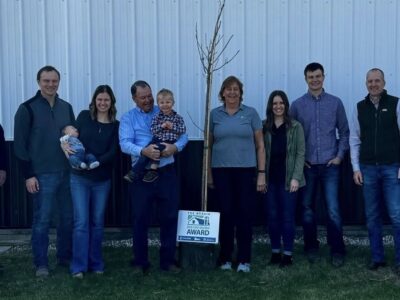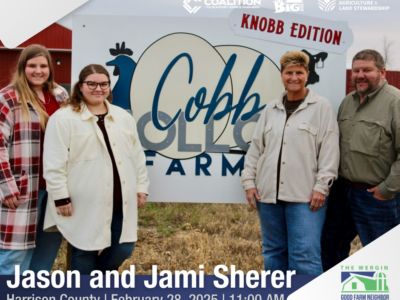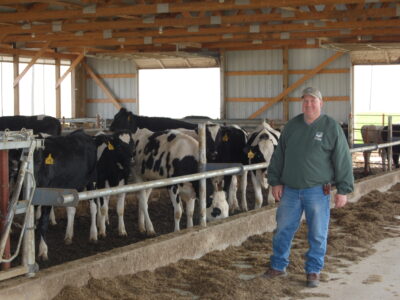Not your grandfather’s hog house
02-13-2020 in Article
WEST DES MOINES, Iowa – January 9, 2020 –The latest addition to Kyle Halls’ farm sits just south of Osceola along the picturesque Jefferson Highway Heritage Byway, a primary national north-south freight route prior to construction of the Interstate system.
Halls’ 2,400-head feeder to finish hog unit sits well back from the road, and boasts the latest in hog barn design. He consulted the Coalition to Support Iowa’s Farmers (CSIF) for siting and neighbor relations advice.
Halls considers the unit an investment in his, and his children’s, future.
“I have three young children,” says Halls. “I want them to be able to join in the farming operation when they’re old enough and be able to make a good living.”
At age 34, Halls has firm ag roots and his eye on the future. He’s been farming with his father and raising cattle since he was 16. He has spent the past 17 years working off the farm as a lineman for the local REC, a job he loves, but not as much as he loves farming. He plans to leave the position for full time on the farm this spring. He also owns and operates heavy construction equipment for hire and completed his own dirt work on the hog unit site.
“I guess you could say farming’s been in my blood since I was a kid playing with my toy tractor on the floor,” says Halls. “Now, I’ve worked my way up to the big tractor.”
The feeder to finish barns will enable him to double stock, moving the young pigs as they reach 55 pounds, according to DNR regulations.
“Having the hog barn really penciled out,” says Halls, “and the workload is still manageable.”
New construction, new design
The buildings are state of the art.
Solid sidewalls replace the commonly used curtains, with windows for light that open if needed. The solid walls increase energy efficiency, with 50-60 percent reductions in LP use reported by other operators, according to Integrity Builders & Supply Inc. reps.
The design also enhances biosecurity.
“This design is ideal for odor mitigation,” explains CSIF Senior Field Coordinator Kent Mowrer, who also helped with siting selection and regulations. “The goal is to mix odor and air as quickly as possible. This system optimizes that approach.” Halls plans to tap CSIF’s Green Farmstead Partner Program to install a windbreak of trees and shrubs once all construction work is complete to further enhance energy efficiency and odor mitigation.
The building’s gating system allows for flexibility for staging and pig comfort, and rapid exit for loading. The slatted concrete floor covers 8 feet of storage that holds enough manure to fertilize 200-250 acres of corn. Variable speed electric fans move air.
But the shining feature of the unit is its automated central control panel that monitors lighting, temperature and ventilation – all from the barn’s office or Halls’ smart phone.
He can reset the building’s thermostats from off-site after loading out pigs, troubleshoot problems highlighted in text messages from the system, or view activity at the building and grounds.
A back-up generator provides added environmental protection.
“This isn’t just a hog barn, it’s a $700,000 high-tech investment,” says Halls. “It’s not your grandfather’s hog house.”
Good neighbors
As a swine partner, Halls chose Maschhoffs, a fifth generation hog producing family headquartered in Carlyle, Illinois. The largest network of family owned pig farms in North America focuses on their production partners’ farm diversity.
Company representative Chad Heisdorffer proved to be a valuable asset when navigating neighbor relations as well. He worked with Halls and Mowrer to organize a neighborhood meeting at Halls’ home with himself and Integrity Builders experts present to answer questions.
All were present on December 20 for an open house hosted by CSIF. Around 175 neighbors and stakeholders attended to dine on pork sandwiches and see the finished facility a mere two days before the first pigs arrived.
That was the day Halls had been waiting for.
“My parents created the opportunity for me to farm and work alongside them,” says Halls. “Now I get to do that for my kids. I can’t thank CSIF and everyone else enough for that.”
CSIF is a non-profit, non-lobbying organization that assists livestock farmers who want help interpreting rules and regulations, guidance on identifying good site locations for barns, counsel on enhancing neighbor relations and tips on how to protect the environment at no cost. This positive, solutions-based approach to helping livestock farmers grow is a collaborative effort involving the Iowa Cattlemen’s Association, Iowa Corn Growers Association, Iowa Farm Bureau, Iowa Pork Producers Association, Iowa Soybean Association, Iowa Turkey Federation and Midwest Dairy. For more information, call 800.932.2436 or visit supportfarmers.com.
(By Terri Queck-Matzie for CSIF. Queck-Matzie is a freelance writer from Greenfield).
-30-
Recommended News

Des Moines County crop and livestock farmers are leaders in their community and Iowa agriculture
Iowa Secretary of Agriculture Mike Naig will present the Wergin Good Farm Neighbor Award to the Dan and Jan Keitzer family of Des Moines County on Friday, April 11. The...
Read More
Harrison County poultry producers are leaders in their community
Iowa Secretary of Agriculture Mike Naig will present the Wergin Good Farm Neighbor Award to the Jason and Jami Sherer family of Harrison County on Friday, Feb. 28. The presentation...
Read More
Naig, Mowrer Named Honorary Master Pork Producers
The Coalition to Support Iowa’s Farmers (CSIF) today launched the Building Your Livestock Legacy Program, a self-guided, online mentorship initiative designed to connect aspiring livestock farmers with essential financial resources...
Read More